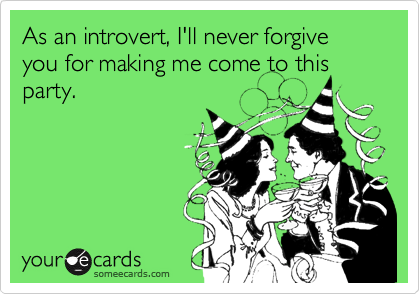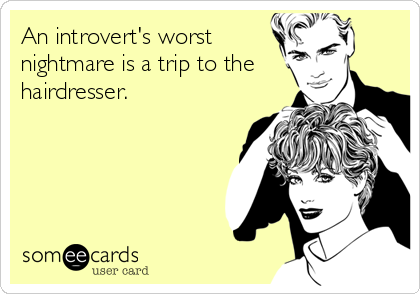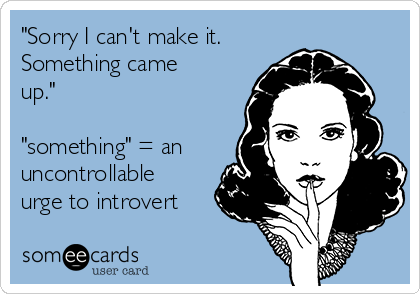I have always desired to be unique. Sometimes, I would even to go as far as to manufacture a preference, simply to be different. But the more I read and the more I interact and the more I get to really know myself, I'm finding more connections to my fellow human. I actually like it.
I've been reading Susan Cain's Quiet: The Power of Introverts in a World that Can't Stop Talking, and I am mesmerized. To clarify, there is a difference between being shy and being an introvert. While many would consider me "outgoing," "loud," even, I am most certainly an introvert.
Not only am I, at least half the world is. You could be one, too, but never realized it.
I have reached a fascinating segment which discusses the Western culture's extroversion ideal, as opposed to the East's appreciation for the introvert. As I read on, I gasped at this passage:
What looks to Westerners like Asian deference . . . is actually a deeply felt concern for the sensibilities of others. As the psychologist Harris Bond observes, "It is only those from an explicit tradition who would label [the Asian] mode of discourse 'self-effacement.' Within this indirect tradition it might be labeled 'relationship-honouring.'" And relationship honouring leads to social dynamics that can seem remarkable from a Western perspective.
It's because of relationship honouring, for example, that social anxiety disorder in Japan, known as taijin kyofusho, takes the form not of excessive worry about embarrassing oneself, as it does in the United States, but of embarrassing others.
Now I know where us Jews have gone wrong!
Upon analysis, Judaism, too, favors the introvert; Moshe was one, after all, begging to not be a leader. Note most of our forebears and authoritarians were shepherds. I don't see an extrovert hanging out with only sheep for company, do you?
 But over the millennia in the Diaspora, we have been exposed to different societies, and their version of what "ideal" is.
But over the millennia in the Diaspora, we have been exposed to different societies, and their version of what "ideal" is.

While we are commanded to be silent in the face of parental criticism, we chafe at the idea of filial piety. While we are admonished never to shame another, we insist we are being "honest." What happened to "emor m'at v'asei harbei"? We prefer the swagger of wordy PR as opposed to quiet diligence.

If one leafs through a pile of shidduch profiles, chances are by "seeking," "outgoing" will be listed. Sometimes even twice.

But a third to a HALF of humanity are introverts. We don't necessarily enjoy the company of extroverts, heck, we may not even enjoy socializing at all. Yet while we were taught that muted discipline is the Torah way, there is a contradictory lesson; we have also been bred to believe that the obnoxious guy who makes a spectacle of himself is a "character," instead of an "idiot." So we think we have to be that idiot, too.

As mentioned in the passage above, introverts are anxious about social interactions for fear they may hurt someone else. How many times I come home from a wedding or a dinner or shul, playing over and over the conversations that took place, and often finding—to my horror and remorse—a comment I uttered that could have possibly been taken the wrong way. It's harrowing.
Take a look within. Google "introvert," and browse the criteria. You may find yourself and your inner Jew. No need to be ashamed. No need for denial. No need to apologize if it's not your idea of a fun evening to hang out with fifty people. You're not weird. There are 3.5 billion out there who would rather be in bed with a book.

Take a look within. Google "introvert," and browse the criteria. You may find yourself and your inner Jew. No need to be ashamed. No need for denial. No need to apologize if it's not your idea of a fun evening to hang out with fifty people. You're not weird. There are 3.5 billion out there who would rather be in bed with a book.

4 comments:
I'm not sure I follow all your reasoning. I'm a pretty extreme introvert (and very shy too), but my social anxieties are often about myself, not others. These days I'm also a bit wary of schematic west/east divisions. And I don't see why caring for other people's feelings is uniquely introverted.
More to the point, I don't think Judaism is an introverted religion. Our prayers are supposed to be communal, our Torah study is supposed to be communal or at least in pairs, our acts of kindness are often located in the community. (Maybe I feel the difficulty of davening in a minyan and chevruta learning more as an introverted man who often struggles with these things?) There's stuff there for the introvert, albeit often in ignored corners, but there's plenty for the extrovert too, as there should be. And I don't think you can read too much into the choice of shepherding as an introverted occupation - people didn't choose careers in those days. You were a farmer or shepherd or whatever because that's what your family did.
Still, interesting food for thought and going to the barber is indeed my worst nightmare.
According to the above cited book, one of the reasons why introverts find social situations exhausting is because they are second guessing everything they say lest they say something hurtful. I'm also an introvert, but I've decided I don't care anymore if I look stupid. I care more if I hurt someone else.
My point was not east vs. west, but different cultures vs. us. Cultures do vary, and they can have something to teach others.
I find it interesting how minyanim is stipulated to begin with. Maybe because the typical Jew (once upon a time) would have preferred to daven alone, perhaps thinking it is the ideal to speak alone to Hashem. But no, we are told that it is better to daven together. The introvert is forced to see his brethren, because we are as one man and one heart. It's always about balance—be an introvert, but daven with nine other of your people. See outside yourself. Be an individual among many, not a clone of the hive.
Extroverts get the things done that require chutzpah—and I salute them, because they can do it. But if I did, I would be a sobbing, emotional wreck. But extroverts in general get more accolades than the introverts do; our gifts are considered "meh." We need a little PR.
Moshe was alone with the sheep; Dovid was alone with the sheep. The shvatim were not alone; they shepherded together. Not all shepherds became leaders.
I need to stop caring about looking stupid...
I find it interesting how minyanim is stipulated to begin with.
Yeah, but EVERYTHING in our religion is stipulated! Valid point about individual davening, though. It's actually an argument between Rambam and Ramban (as usual). IIRC, the Rambam says daily, communal set prayer is from the Torah, but Ramban says, no, only spontaneous, private prayer at times of intense emotion is from the Torah; set, communal prayer is rabbinic. Historically, the Ramban is probably right (I don't think anyone agrees with the Rambam here), but it's interesting to consider both positions from a philosophical point of view - the meaning underlying the halakhah. (This from a shiur I went to a couple of months ago; I hope I haven't garbled it.)
Still not convinced about shepherding alone. Avraham and Yitzchak employed teams of shepherds, at least after they got rich.
Of course everything is stipulated. But why is communal prayer emphasized?, I asked? Because an individual would prefer to stay home and daven in his own comfort zone and be in his own thoughts. He is told, no, it is better to be with others. Get out of your own head, introvert.
But it doesn't say that Avraham and Yitzchok were chosen because they were shepherds, as it does by Moshe and Dovid. Being a lowly shepherd (as opposed owning flocks and flocks and outsourcing the work) was the test.
Post a Comment